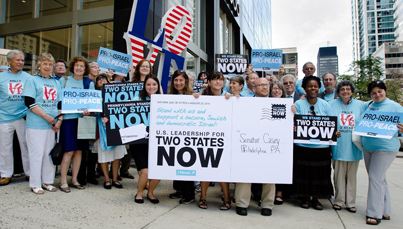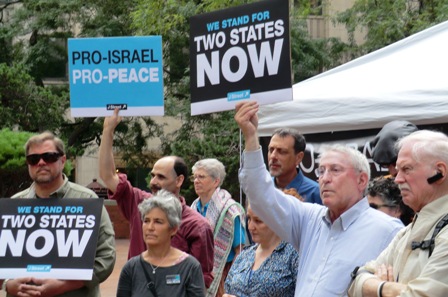
After a year of protesting Jewish and pro-Israel institutions for their refusal to demand that Birthright Israel incorporate Palestinian voices during trips to Israel, J Street is now launching its inaugural “Let Our People Know Trip.”
The trip’s itinerary is formulated according to the notion that:
“omission and erasure of Palestinian perspectives and narratives on these trips creates a political environment that allows home demolitions, settlement expansion, and other destructive policies of occupation to continue unchallenged.”
In other words, J Street created an alternative to the Birthright trip that claims to provide “nuance” regarding the Israeli experience. As stated in the organization’s description of the trip, this nuance — reflecting “Progressive Jewish values” — can only be understood by exposure to the Palestinian experience. In its persistent attempt to divide the Jewish community in America, J Street’s new trip is fundamentally flawed and offensive for two reasons.
First, it openly declares that Israel can only be understood through a progressive lens. In unveiling the trip, J Street transparently states:
“To be consistent with our progressive Jewish values, organized educational trips for young American Jews must present a robust, nuanced and honest view of the current realities on the ground in Israel and the Palestinian Territory.”
Are conservatives unworthy or unable to experience Israel or her contemporary political complexities?

Second, and most dangerous, J Street conflates Jewish identity and connection to the land of Israel with a modern political conflict less than a century old.
Birthright’s mission has been — and continues to be — a pure attempt to guarantee all and any Jews around the world the opportunity to explore their roots in Israel at least once in their lives. Birthright is a trip that seeks to establish or strengthen the bond between the Jewish people and the land of Israel. J Street’s attempt to compete with Birthright is therefore a statement that Israel can — and should — only be experienced through exposure to the conflict with the Palestinians and to Palestinian suffering.
We have watched the United Nations attempt to diminish Jewish connections to the land of Israel. We have heard the Palestinian Authority call Jewish prayer on the Temple Mount a desecration by the “filthy feet” of the Jews.
But to have an American Jewish organization conflate 2,000 years of Jewish connection to the land of Israel with a modern political conflict is dangerous and reckless. It is one of the most divisive and harmful actions against the American Jewish community that has been taken by J Street.
In launching this trip, J Street calls on American Jews to make the following commitment:
“We pledge to only participate in organized trips to Israel that include meaningful engagement with key questions related to the Israeli-Palestinian conflict, the occupation, and the status of minority groups in Israel. We will only participate in trips that include meetings with both Israelis and Palestinians and that show participants how the occupation impacts the daily lives of Palestinians living beyond the Green Line.”

Why can’t Jews connect with the Valley of Elah, where David brought the mighty Goliath down with his slingshot, unless the nearby settlements are spoken about?
Why can’t Jews connect with the Cave of the Patriarchs in Hebron without engaging with Palestinians, some of whom are forced to live in a misery that their own leaders have abetted?
Why can’t Jews visit the Old City of Jerusalem and connect with the Western Wall without having to sit through a lecture on living conditions for Palestinians in East Jerusalem?
While these issues are integral to the political framework surrounding the Israeli-Palestinian conflict, they should not be presented as defining Israel’s fundamental ties to Jewish identity.
In hijacking the progressive narrative and promoting historical inaccuracies, J Street’s attempt to hold Israel primarily responsible for Palestinian suffering is setting a dangerous precedent based on politicizing Jewish heritage.
Palestinian existence does not shape what Jews have experienced either in Israel or the Diaspora. The unfortunate political complexities created by Arab rejectionist attitudes towards a Jewish state do not define our connection to the land.
J Street’s latest initiative is reckless, harmful, and divisive. The Israeli-Palestinian conflict does not define a Jew’s inherent connection to the land of Israel, and any attempt to politicize our heritage should be outright condemned.
Originally published in The Algemeiner.
Contributed by Campus Coordinator Yoni Michanie.

